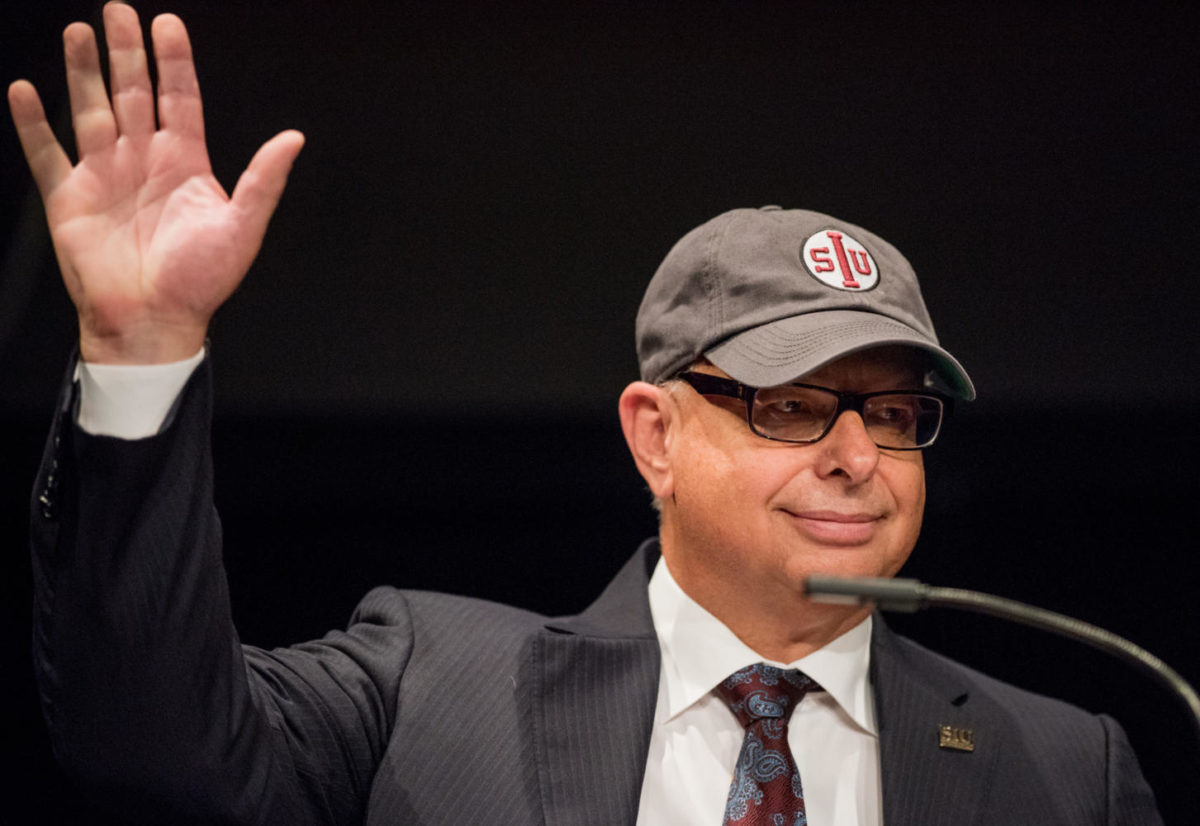Campus community ‘utterly frustrated’ by the chancellor’s plan to restructure the university
Southern Illinois University Chancellor Carlo Montemagno waves to the audience after his “State of the University” speech Tuesday, Sept. 26, 2017, at Shryock Auditorium. Montemagno spoke on his vision for the university and the steps administration plans to take to increase enrollement numbers. (Brian Muñoz | @BrianMMunoz)
October 25, 2017
When speaking to Chancellor Carlo Montemagno regarding his plan to restructure the university, many students and faculty say they are beginning to feel like their opinions are falling on deaf ears.
During a speech Montemagno gave last week on campus about his academic shake up, he spoke of the value of shared governance, but at times, students said he only asked for faculty input, and some faculty members said the chancellor is not receptive to changing his ideas.
“That’s not by any means shared governance or a democratic approach,” history professor Gray Whaley said. “It’s quite the opposite; it’s offering a veneer of democracy.”
Advertisement
Montemagno asked the audience to not listen to those with “a lack of heart” and those who “will actively point to shadows in the dark to inject uncertainty and unfounded fear.”
Lauran Schaefer, a graduate student in communication studies, criticized Montemagno for what she said was an attempt to paint those who object to his ideas as “cowardly” and “fearmongers.”
The restructuring involves reducing the eight current colleges to five and getting rid of departments and department chairs in favor of a school system.
Whaley said the implementation of a school system could be beneficial for some programs, adding he’s heard positive feedback from educational departments.
Still, he said Montemagno’s school proposal is a one-size-fits-all model that doesn’t actually fit each program.
“He put the most controversial, damaging parts of his plan off the table for discussion,” Whaley said. “I am utterly frustrated with it.”
While Montemagno said he has no plans to turn the university into a polytechnic school, Whaley said the structure Montemagno wants to put in place is basically how polytechnic schools are organized.
Advertisement*
Philosophy professor Sara Beardsworth expressed similar concerns at Montemagno’s forum on Oct. 19, saying she has seen this happen to a previous institution she taught at in England.
After being pressed by students in the audience at the forum, Montemagno offered Dartmouth College as an example of a college that uses the school system.
Dartmouth is composed of four schools, but those schools are lead by deans instead of directors. Further, the schools are divided into departments, each with their own chair. This is a position Montemagno wants eliminate.
“If you take issue with it, he gets offended,” Whaley said. “There’s that whole component of it where he does not want to have discussion of something. He’s quite acerbic and quite frankly, unprofessional.”
Montemagno called departments “bureaucratic obstructions,” yet many professors in the audience disagreed, with one even saying she would not have accepted a position at the university under a school system.
Some students were equally concerned with the chancellor’s plan, though Montemagno reserved most of the question-and-answer session following his speech for faculty members.
One of the students Montemagno called on was a student he referenced working with in his speech — Joshua Bowens, Undergraduate Student Government president.
He was, however, receptive to answering questions from the undergraduate students who interrupted him during the forum.
“I know faculty have a lot of issues too — it’s their departments being moved around,” Victoria Hammond, a senior from Columbus, Ohio studying geology said. “But this really affects students as well. I was really hoping that students would get more of a voice.”
She said the current College of Science should not be “broken up.”
“I feel like the process is very blocky, like, ‘We’re going to put all the dirt people together,” she said.
The Department of Geology is currently drafted to become integrated into the School of Sustainability and Earth Sciences, along with the geography program.
She said if geology were under the same umbrella as any program, at least it is geography, as she said the programs are already intertwined. Still, she questioned what the advantage of having them lumped together is.
Meanwhile, graduate students do not know how their departments will be restructured.
Schaefer said she’s trying to graduate as soon as possible before major changes could affect her.
“If I had known that this would be what’s happening in this university, I would not have chosen to come here,” she said.
She said she questions if prospective students will truly take university structure into consideration as opposed to issues of sexism or racism.
“I don’t really know how we expect students to gain cultural competence when the chancellor —who’s the administrator we hear from the most — has said things like, ‘You shouldn’t identify as black but as a Saluki,’” Schaefer said, mentioning a statement Montemagno said at his open forum as a chancellor candidate in June.
Montemagno mentioned plans to increase diversity education efforts by increasing and changing core curriculum requirements for multicultural courses, of which students are currently only required to take three credit hours.
“A student can choose from more than 50 worthy courses to fulfill the requirement,” Montemagno said. “But none by itself provides the full range of cultural competencies our students need to be successful in the world in which they live and work.”
Montemagno said a new emphasis on multicultural courses will reduce the number of classes people take simply because of requirements while also increasing student interest.
But Simbiat Lugboso, a junior from Chicago studying journalism, said she thinks it will just mean more classes people have to take to graduate.
During his presentation, Montemagno said the classes will be offered in a way that is relevant to different majors.
Schaefer said it’s one area where she commends the chancellor, referencing potential courses that would focus on topics such as diversity in physics.
Hammond said she likes the idea to boost emphasis on these courses to combat diversity issues on campus, but she fears it could spread professors thin.
For example, the Africana studies program is set to lose its status as a major, yet Montemagno said Africana studies courses will still continue to be offered as long as there is student interest.
“Once it’s a minor, it’s gone,” Jada Kelly, a junior from West Chicago studying Africana studies and political science, said.
Hammond said she’s worried a loss of the program as a major could affect professors’ research if they are not bound to a program.
Kelly said she doesn’t believe administration would take the same response if a “vital” major like biology were also experiencing the same low enrollment.
She said she would like the see the Africana studies major stay and believes it could if the program were to partner with other programs — such as criminal justice — that would integrate Africana studies courses into their major requirements.
For those like Kelly, Whaley and Lugboso, they question whether their input will truly be taken into account.
“Honestly, I just hope that it’s not a finalized plan,” Lugboso said. “God, hopefully he actually considers and listens to all the questions and comments that we asked and told him about.”
Staff writer Cory Ray can be reached at [email protected] or on Twitter @coryray_de.
To stay up to date with all your southern Illinois news, follow the Daily Egyptian on Facebook and Twitter.
Advertisement










Bradley Skelcher • Oct 25, 2017 at 2:01 pm
Wow! I am concerned about the future of my Alma mater. I thought only the Ph.D. in Historical Studies was facing trouble. It looks like the entire University is facing unnecessary disruption, which is a management strategy. Just look at Washington, D.C. right now, and you will see management by disruption.